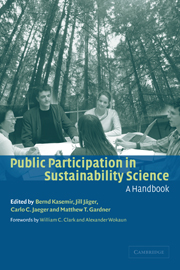Book contents
- Frontmatter
- Contents
- Notes on contributors
- Foreword: science, participation, and sustainability
- Foreword: sustainability, energy use, and public participation
- Preface
- Acknowledgments
- Part I Concepts and insights
- Part II Experiences with IA Focus Groups
- Introduction
- 4 Collage processes and citizens' visions for the future
- 5 Citizen interaction with computer models
- 6 Citizens' reports on climate strategies
- Part III Further forms of participation
- Part IV Future perspectives
- References
- Index
5 - Citizen interaction with computer models
Published online by Cambridge University Press: 22 September 2009
- Frontmatter
- Contents
- Notes on contributors
- Foreword: science, participation, and sustainability
- Foreword: sustainability, energy use, and public participation
- Preface
- Acknowledgments
- Part I Concepts and insights
- Part II Experiences with IA Focus Groups
- Introduction
- 4 Collage processes and citizens' visions for the future
- 5 Citizen interaction with computer models
- 6 Citizens' reports on climate strategies
- Part III Further forms of participation
- Part IV Future perspectives
- References
- Index
Summary
Introduction
This chapter looks at how computer models were used in IA Focus Groups within the study discussed in this volume. In these groups, different computer models – ranging from complex and dynamic global models to simple accounting tools – were used in the second phase of the procedure. Based on a total of 52 IA Focus Groups with citizens, conducted in six European and one US cities, selected empirical results are presented. The analysis of the results focuses on the added value of using computer models during the meetings of such groups, the lessons learned about the models themselves and the ways in which they are used.
The terminology in this field is far from clear. For the purpose of this chapter, we define computer models as all kinds of software tools that include a realistic representation of some social, economic or environmental processes. Integrated Assessment Models (IAM) are included in this definition, but also simpler and non-dynamic tools. On the other hand, by this definition, we are excluding computer games (SimCity and the like) and educational software with text only.
Why use computer models in participatory processes for sustainability science in general, and Integrated Assessment (IA) in particular? We hypothesize that computer models are powerful tools for promoting a numbers of insights about complex sustainability issues like climate change. Computer models provide direct access to expertise and due to their flexibility and interactivity might be better able to support learning processes and decision-making.
- Type
- Chapter
- Information
- Public Participation in Sustainability ScienceA Handbook, pp. 105 - 125Publisher: Cambridge University PressPrint publication year: 2003
- 10
- Cited by



